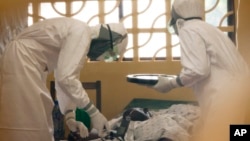Scientists will start testing whether treatment with antibodies in the blood of Ebola survivors can help infected patients fight off the deadly disease in a clinical trial starting in Guinea next month.
If effective, so-called convalescent serum could be scaled up quickly as a short-term intervention while work continues to develop drugs and vaccines.
An international research consortium led by the Institute of Tropical Medicine in Antwerp is undertaking the work in the West African country where the world's worst Ebola outbreak was first confirmed in March this year, after receiving a 2.9-million-euro ($3.7-million) grant from the European Union.
“Blood and plasma therapy are medical interventions with a long history, safely used for other infectious diseases,” Johan van Griensven, the project's coordinating investigator, said in a statement on Thursday.
“We want to find out whether this approach works for Ebola, is safe and can be put into practice to reduce the number of deaths in the present outbreak.”
The World Health Organization last month urged the use of blood-derived products and serum from survivors.
Blood and plasma from recovered Ebola patients has been used occasionally in the past, including during an Ebola outbreak in 1995 in Kikwit, in the Democratic Republic of Congo, when seven out of eight patients getting convalescent whole blood survived.
However, because the number of patients who have received serum treatment to date is small, it is unclear how well the intervention works.





